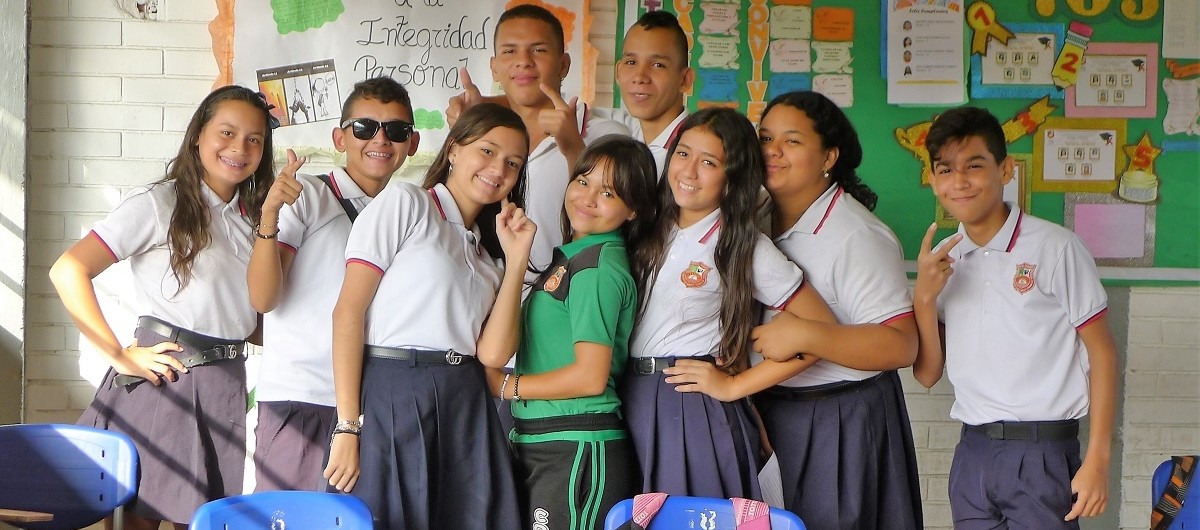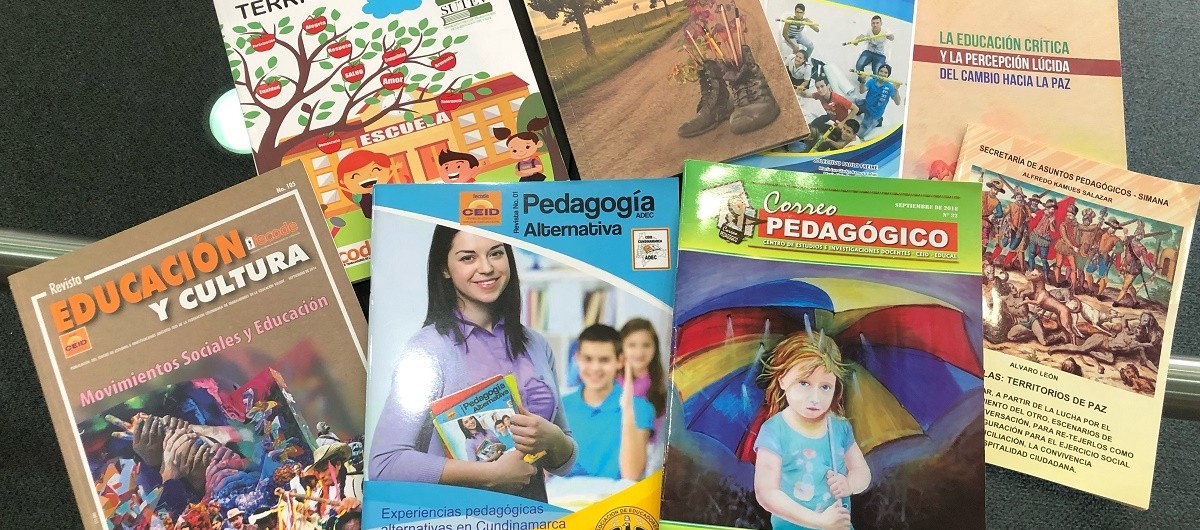In order to build a lasting peace in Colombia, a development cooperation programme between Canadian and Colombian teachers’ unions has helped to develop pedagogical circles and the programme of the Schools as Territories of Peace project. In 2014, Colombia’s principal education union, the Federación Colombiana de Trabajadores de la Educación (FECODE), requested support from Canadian unions affiliated to Education International (EI). That support was needed to develop pedagogical circles and Schools as Territories of Peace (STP) (see below), aimed at building a lasting peace in Colombia.
In order to build a lasting peace in Colombia, a development cooperation programme between Canadian and Colombian teachers’ unions has helped to develop pedagogical circles and the programme of the Schools as Territories of Peace project.
In 2014, Colombia’s principal education union, the Federación Colombiana de Trabajadores de la Educación (FECODE), requested support from Canadian unions affiliated to Education International (EI). That support was needed to develop pedagogical circles and Schools as Territories of Peace (STP) (see below), aimed at building a lasting peace in Colombia.
Three Canadian unions responded positively to the call to develop this alternative pedagogical project. They were the Centrale des syndicats du Québec (CSQ), the Ontario Secondary School Teachers’ Federation (OSSTF), and the British Columbia Teachers’ Federation (BCTF), coordinated by CoDev, an international cooperation agency.
Article from Education International, to be read on their website.

Difficulties in extending pedagogical circles
The initial project ran from 2014 to 2017 and facilitated the development of pedagogical circles in 10 provinces. In view of the success of this first stage, a second project has enabled these pedagogical circles to be extended in the country’s 32 provinces.
However, many obstacles to the implementation of the pedagogical circles have been noted:
• The curriculum is demanding, class hours must be accounted for, and there is no time left for discussion in the context of pedagogical circles.
• Some towns have not given teachers permission to meet up in pedagogical circles. However, FECODE has emphasised that teachers are independent and have the right to meet and discuss topics they want to.
• Some teachers dare not speak about democracy, because they fear being targeted as opponents of the regime.
• Following the recent FECODE elections, the newly elected representatives have to start from scratch again.
Review visit
From 10-17 November 2019, a delegation comprising eight representatives from the three donor unions, CoDev, and the Canadian Teachers’ Federation (CTF) visited Colombia to assess the progress of the STP project.
They held meetings with the Executive Committees of FECODE and CUT (Centrale unitaire des travailleurs), CEID researchers (the FECODE Research Centre), and a researcher from the Escuelas de Paz Foundation (Foundation for Schools of Peace). The delegation then divided into three groups, and visited three cities: Cucuta, Monteria, and Facatativa. Finally, debriefing meetings were held in Bogota with FECODE Executive Committee members.
These field visits established that:
• Schools are victims of the war. In particular, the presence of land mines in school grounds was observed as was a military or paramilitary presence in schools.
• Schools are victims of neoliberal policies. There has been a disinvestment in education in order to support the war effort, pay the country’s external debt, and cover its fiscal deficit. Education is also no longer seen as a fundamental right and is being exploited.
• Teachers are being victimised. A total of 1,075 teachers have been murdered while 1,800 have been displaced, 50 have disappeared, 70 have been exiled, and 60,000 have been threatened.
According to the FECODE President, Nelson Javier Alarcón Suárez, the continuation of the STP project is crucial to the peace and reconciliation process. It is all the more important in areas where many teachers have been murdered and schools have been the target of violence. Thus, international solidarity for FECODE in order to continue this project.
The five pillars of Schools as Territories of Peace
The STP alternative pedagogical project is based on five pillars, namely:
1. School democracy
2. School programmes must be linked to the realities of each community
3. Closer links between schools and their communities
4. Teaching conditions, namely living conditions, working conditions, and professional conditions for teachers
5. Memory, identity and repair
FECODE and CEID pint out that these alternative pedagogical methods are based on methods developed by Latin American researchers, including Paolo Freire.
Support sought for continuation
The second three-year cycle of STP ends in March 2020. Given its success and impact, FECODE is seeking support to continue the project for another three years. It will submit an application to CoDev to be assessed by the three Canadian unions involved in the project – CSQ, OSSTF and BCTF.
For FECODE, an additional benefit has seen its membership numbers retained in a period of sharp decline in trade union representation in Colombia. This decline is mainly due to threats to trade unionists, as well as violence at their workplace.
In quantitative terms, the assessment done by FECODE indicates, inter alia, that:
• Eight training seminars have been held over three years.
• 245 STP experiences have been surveyed.
• There has been increased participation in pedagogical circles.
However, FECODE emphasises that a quantitative assessment alone does not tell the whole story. Qualitative assessment is, in its view, much more important, even if it proves difficult to assess an approach such as the STP, or the use of alternative pedagogical methods.

EI: Quality education, essential for healthy and sustainable societies
EI has been supportive of initiatives such as the STP. “Value-based quality education can make an invaluable contribution and the classroom will always be the most preferable place to build tolerance and peace,” said David Edwards, General Secretary of EI.
“The primary mission of education should be to study the world in light of the following question: How can we live together in a shared world? Each programme must be shaped based on this mission, so that we can contribute to a peaceful society.”
Resolution
The Resolution on education, peace and justice in conflict areas, adopted at the EI 7th World Congress in Ottawa, Canada, in July 2015 also recognises that: “Education is a human right and a public good. Schools and universities should be places where teaching and learning can take place in a safe environment. These are the fundamental values to which Education International subscribes.”
In addition, the resolution highlights that “students and educators in situations of armed conflict face violence every day. Schools and universities should be safe havens, where communities can work toward a better future”.
It therefore denounces the fact that, “in many places, these institutions have become the targets of violent attacks for political, military, ideological, sectarian, ethnic, religious or criminal reasons”.
This is why the resolution calls on “affiliates to press their governments to adopt and endorse the international guidelines for protecting schools and universities from military use during armed conflict”.
Similarly, EI encourages all its members to support its Declaration, “Schools shall be safe sanctuaries”.




